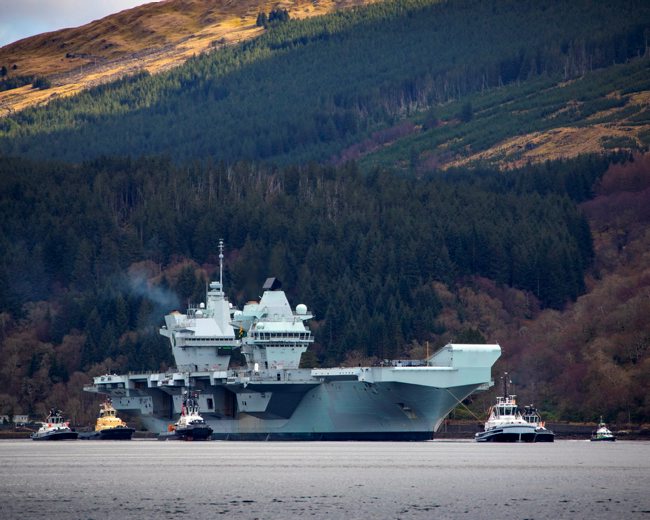
Keeping the Atlantic open so European allies can remain in the loop with the United States and Canada during a crisis has “always been the case in NATO military strategy” and remains so today, the chief of the United Kingdom’s defense staff said Tuesday.
Gen. Sir Nicholas Carter said that even in this “era of consistent competition” with authoritarian powers like Russia and China, London looks first to the challenges coming from Moscow in assessing threats.
Speaking at a Center for New American Security forum, he said the Kremlin’s advances in submarine technologies and deep undersea capabilities in its Northern Fleet means “you are right to focus on the maritime” from the North Atlantic to the Arctic as a major security concern for allies and partners like Sweden and Finland.
Seeing this as a new threat, Carter said “we need to be thinking hard about … capability and deterrence” in the High North, especially where operating conditions are difficult.
Carter added, “the High North [above the Arctic Circle] wouldn’t have been” judged so critically important “three or four years” ago. But warming Arctic waters have opened the Northern Sea Route, which is closest to and claimed by Russia, for longer use and brought new attention to what was at stake for NATO. To back up territorial claims, Moscow expanded its military and civilian presence there to expand its energy extraction and export industry, especially to China.
The United Kingdom, Sweden, Norway, Denmark, Finland and the Netherlands – what Carter called “the Quint” – “are focused on the region” and the changing maritime security conditions in the Arctic. Those nations are also working with Estonia, Lithuania, Iceland and Latvia on building maritime capability for deterrence in the Baltic Sea. Russia maintains a naval enclave in Kaliningrad on the Baltic.
Farther to the south, Carter said NATO’s maritime presence on the Black Sea shows the alliance’s depth in deterring Russia and monitoring migration flows from the Middle East through Turkey and terrorist activities. He called that part of NATO’s 360-degree view of the changed security environment globally. An example of the importance the alliance attaches to the southern flank and Ukraine’s struggle with Russian-backed insurgents includes this summer’s Sea Breeze exercise, led by Washington and Kyiv. More than 30 nations participated in the exercise.
He added, “one has to be careful” in operating in the Black Sea. “There are all kinds of tensions” there over territorial claims and restrictions on what types of warships are allowed.
Quoting French President Emmanuel Macron on NATO being “brain dead” and needing an alliance strategy overhaul, Carter said the members need to see there is “a continuum of competition,” from the “insidious approach” of gray zone activities to “undermine our way of life” to armed conflict.
NATO must “incentivize allies” to step away from industrial-era concepts of warfare to “taking risks in the short term.” That kind of modernization strengthens the alliance’s “digital backbone,” improves interoperability across multiple domains and continued integrated operations from conventional to nuclear warfare under Russia’s doctrine of first use of tactical nuclear weapons in a regional conflict.
In his opening remarks, Carter said, “the side who adapts most quickly” to strengthening the digital backbone likely wins in the future. He added this should be one lesson NATO learned from last fall’s fighting between Armenia and Azerbaijan, when the Armenian forces command and control network was effectively neutralized.
“Our rivals have studied our way of warfare” and Russia and China are pressing ahead on unmanned systems in the three traditional domains and new undersea and hypersonic technologies.
He also said this means the U.K. is open to “ad-hoc groupings around shared interests” in addition to its traditional treaty alliances.
When asked about the Australia, United Kingdom and United States [AUKUS] agreement on sharing technology, including nuclear propulsion for submarines, Carter said “it was consistent with what [London] published in our integrated review” of defense strategy and spending.
He added that the request came first from Australia and went beyond submarines. Over the next 17 months, the three nations will examine cooperation on artificial intelligence, quantum computing, cyber and underwater capabilities. “I think those are obvious overlaps,” but “there are some question marks on information sharing.” He added later that the U.K. did not see the agreement as being “exclusive” to the three nations. He compared it to the “ad-hoc groupings around shared interests” with other partners, potentially Japan.
In addition, “pace and industrial capacity” are areas “we will be looking at clearly” during that time to start building the submarines and exchanging technologies.
Although it has historic trade interests and security alliances in the Indo-Pacific, Carter said the presence of the United Kingdom’s Queen Elizabeth Carrier Strike Group is “not going to happen every year.” He said the U.K. intends to have two warships operating continuously and have a “littoral strike group from time to time” there as it balances the demand for its forces in Europe and the Atlantic.





